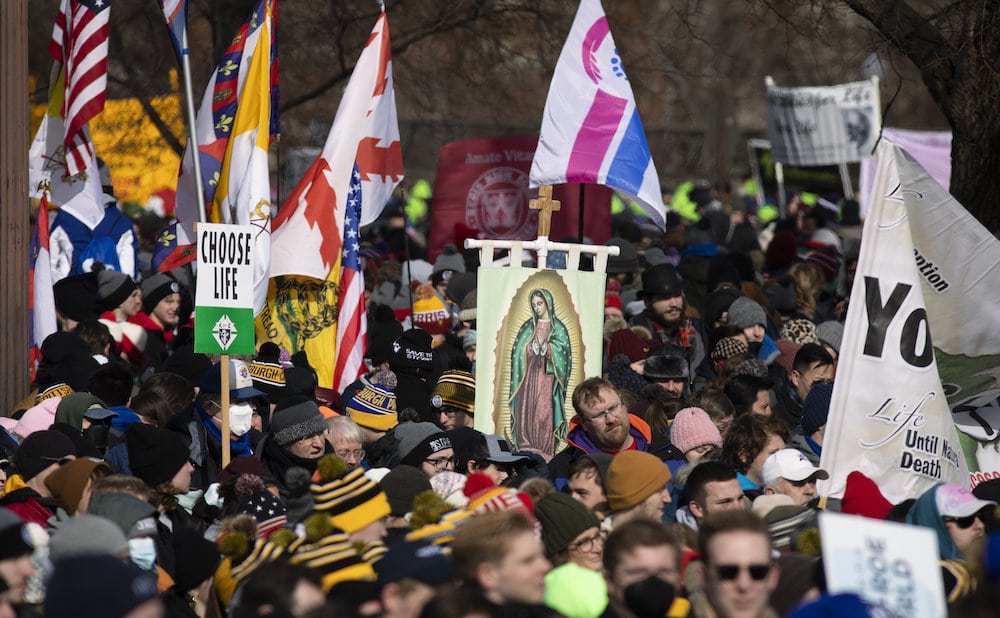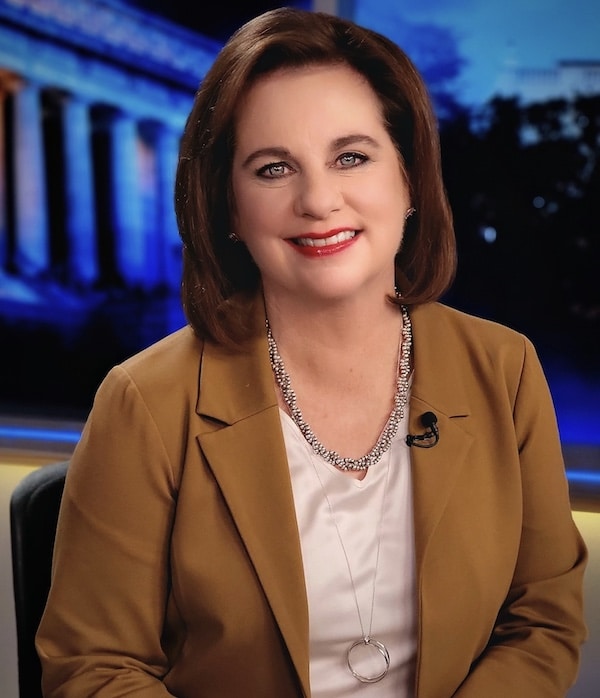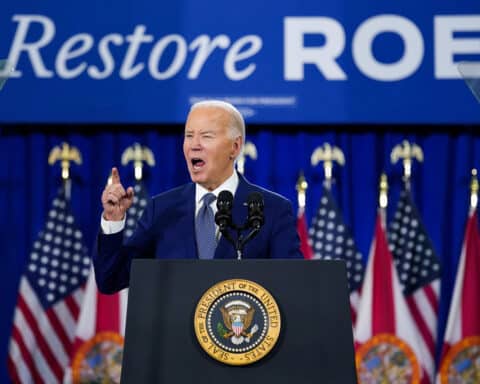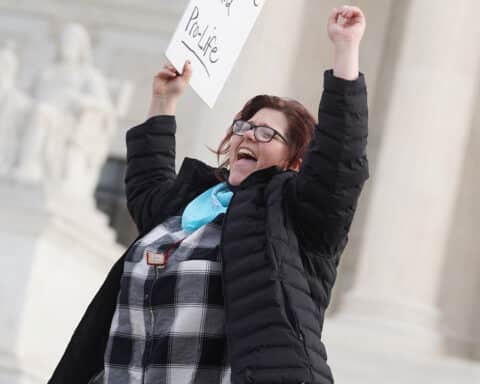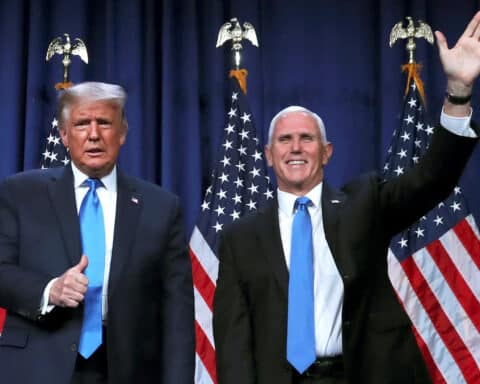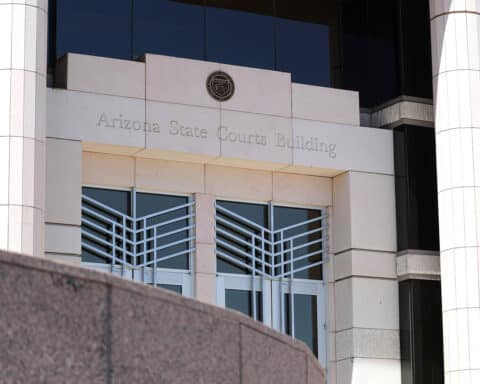The national pro-life movement is, in large part, led by women and men who converted to the Catholic faith.
While each tells a different story of his or her journey to the Catholic Church, all of the leaders who spoke with Our Sunday Visitor came from Christian backgrounds. Many of them first encountered Catholics through their pro-life advocacy. Another became pro-life after meeting Catholics.
Today, all of them agree that their pro-life advocacy and Catholic faith are inseparable. And, while they work in different lanes of the pro-life movement, they aim in the same direction: toward building a culture and society that cherishes the inherent dignity and worth of every human person from the moment of conception.
Our Sunday Visitor recently spoke with four Catholic converts leading the pro-life movement: Lila Rose, founder and president of Live Action; Kristan Hawkins, president of Students for Life of America; Marjorie Dannenfelser, president of Susan B. Anthony Pro-Life America (SFLA); and David Bereit, a pro-life strategic adviser and co-founder of 40 Days for Life.
These are their stories — and their hopes for the future of the movement.
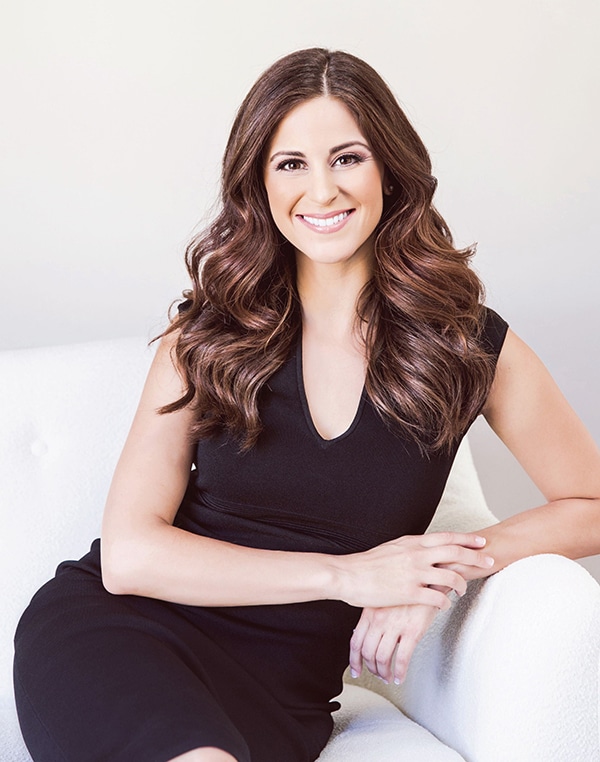
Lila Rose
Raised in an evangelical Protestant family, Lila Rose first questioned her faith in high school.
“Was I even a Christian?” the 34-year-old pro-life leader remembered thinking. “I kind of had to rebuild my own understanding of faith by doing my own research.”
As a college student at University of California, Los Angeles, she explored various faith communities. But, she said, they left many of her theological questions unanswered.
That changed when she met Catholics at her university.
“After some more study and after just a matter of time, when I came to realize what the Eucharist was and came to see that this is the Church that Christ founded 2,000 years ago, I was just like, ‘Let me in. Let me in as soon as possible.'”
— Lila Rose
Rose encountered Catholics through the college chapter of her pro-life group, Live Action, she said. They, in turn, connected her with a local Catholic women’s center.
“After some more study, and after just a matter of time, when I came to realize what the Eucharist was and came to see that this is the Church that Christ founded 2,000 years ago,” Rose described, “I was just like, ‘Let me in. Let me in as soon as possible.'”
She entered the Catholic Church in 2009.
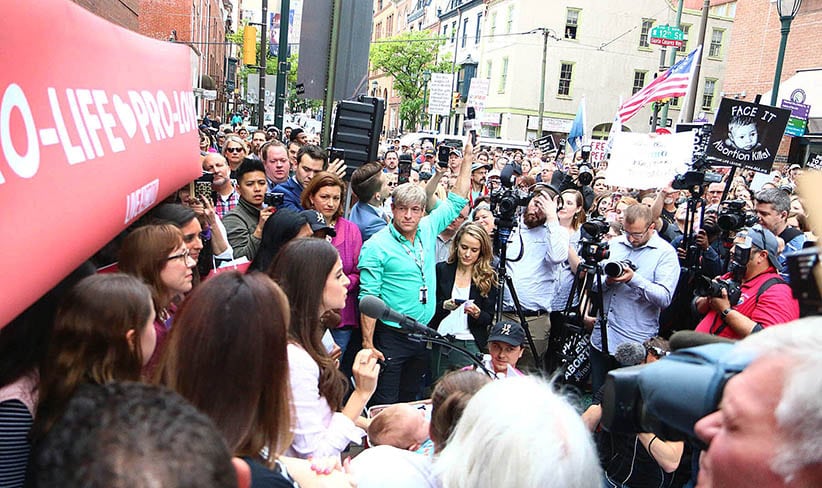
Today, Rose lives in Southern California with her husband and two sons while leading Live Action, a nonprofit perhaps best known for releasing undercover investigative videos of the abortion industry. The group boasts the largest online presence in the pro-life movement, with content that reaches millions each month.
Rose remembered realizing the destruction of abortion as a 9-year-old girl after she came across a book called “The Handbook on Abortion,” by Dr. and Mrs. J.C. Willke, she said. She opened its pages to find images of fetal development — and victims of abortion.
Those images, she said, convinced her that abortion was a crime against humanity.
“The more I learned about it, the more I wanted to do something about it,” she stressed.
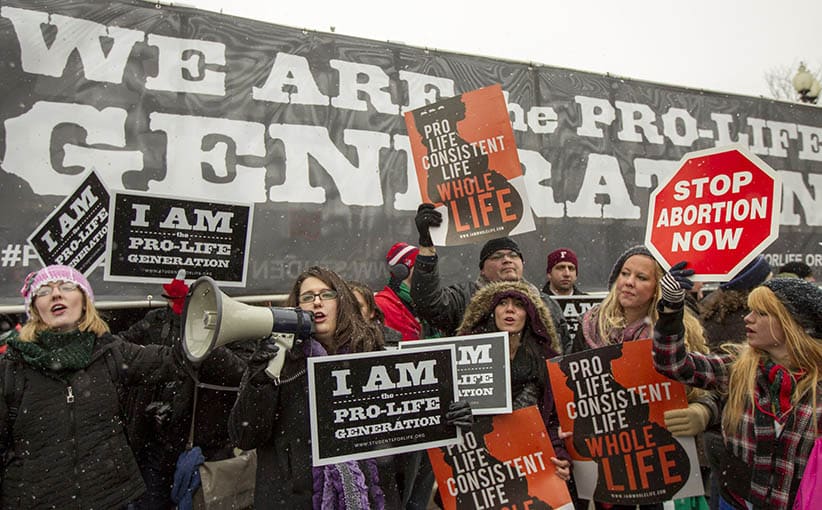
Kristan Hawkins
Growing up, Kristan Hawkins said she only knew lukewarm Catholics. She met a different kind of Catholic when she began Students for Life of America in Washington, D.C.
The 37-year-old pro-life leader remembered placing the first job ads for her group.
“All I could pay was basically commission and expenses,” she said. “The only people that really would apply to my crazy job ad were these … very well-formed Catholics who knew their faith.”
That encounter, she said, began her own journey as a non-denominational Christian to the Catholic faith.
“I think my conversion story, it’s fairly simple,” she said. “It’s meeting other Catholic leaders within the movement, talking with staff members over the years, and just really hearing the truth about our faith.”
“I think my conversion story, it’s fairly simple. It’s meeting other Catholic leaders within the movement, talking with staff members over the years, and just really hearing the truth about our faith.”
— Kristan Hawkins
“It was absolutely the pro-life movement,” she concluded, “that led me to the Church.”
She entered the Catholic Church at the Easter Vigil in 2015.
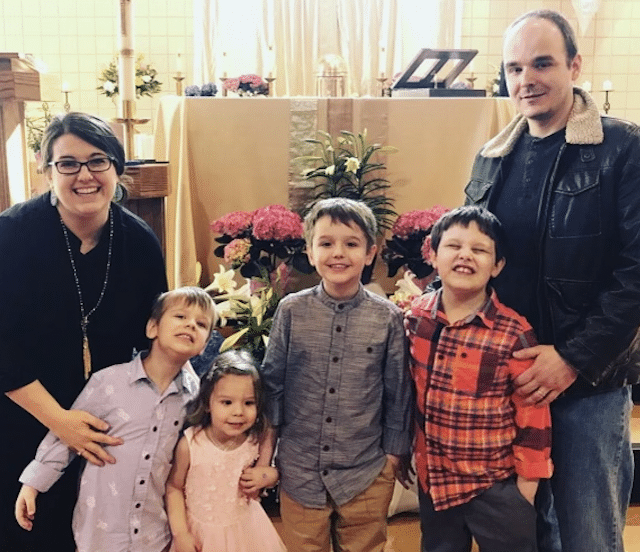
Today, Hawkins leads a team that serves 1,400 pro-life student groups on middle, high school, college, university, medical and law school campuses in all 50 states. Combined, they contribute more than $21 million in in-kind volunteer services to women and families every year, SFLA estimates.
While speaking at colleges and universities nationwide, Hawkins lives in various states as she travels across the country in a camper with her husband and their four home-schooled children.
Hawkins’ pro-life work began as a teenager. At 15 years old, she interned at her local pregnancy center at the invitation of a woman from her church. While there, she trained as a counselor — and worked alongside Catholics.
“It was a pregnancy resource center run by mostly all Catholics, families of basically Franciscan University,” Hawkins said, referring to the Catholic university in Steubenville, Ohio. “That’s where I would say I actually became pro-life.”
Marjorie Dannenfelser
Marjorie Dannenfelser met Catholics before becoming pro-life, but, like the others, said that “Catholics led me to become Catholic.” They were also key, she said, to her pro-life conversion.
Raised in an Episcopalian family in North Carolina, Dannenfelser said she met Catholics for the first time during a D.C. internship while studying at Duke University.
“I met a whole group of just kind, smart, faithful Catholics who so loved their faith that it just, it inspired me,” the 57-year-old pro-life leader remembered.
Among other things, she embraced the intellectual depth of the Faith and the openness of these Catholics to debate and engage in conversations about apologetics.
She entered the Catholic Church in 1989 at Pentecost. It happened shortly after she became pro-life.
“I thought it was really smart, but my position was so shallow … it basically boiled down to ‘My body, my choice,'” she remembered as a philosophy major.
“I could have fooled myself forever. I was engaged in the [pro-abortion] argument a lot, and I lost — which was the best gain I’ve ever had.”
— Marjorie Dannenfelser
“It just became super obvious that I had been satisfied with staying in the shallows and not going deep because I was afraid of myself and because I was afraid — because I would have gotten an abortion myself, and because I didn’t want to be one of those [pro-life] people,” she said.
Looking back now, she said, the Holy Spirit guided her arguments going back and forth on abortion.
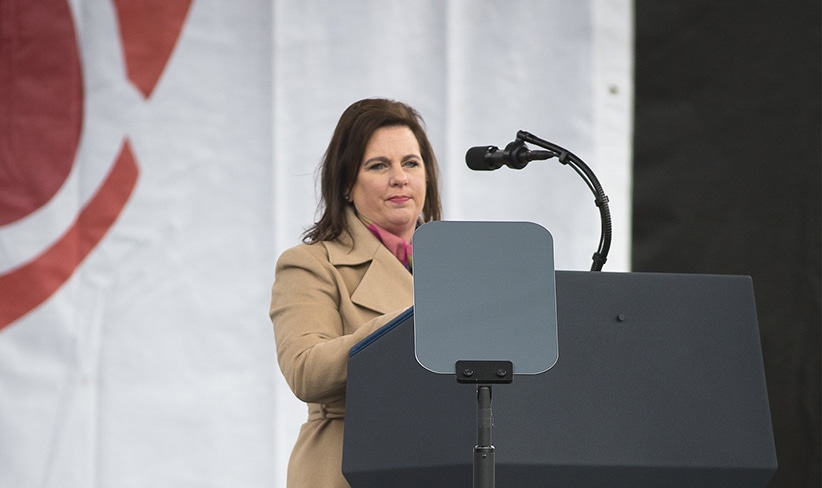
“I could have fooled myself forever,” she said. “I was engaged in the argument a lot, and I lost — which was the best gain I’ve ever had.”
Two arguments in particular resonated with her: “I really could not satisfactorily answer the question, ‘What is that thing? The object of the abortion, what is it?'” she said. And, then: “‘What if I’m wrong [supporting abortion]?’ The consequences of being right aren’t terrible, but the consequences of being wrong are eternal and damaging.”
Today, the mother of five lives in Arlington, Virginia, and leads the nation’s largest grassroots pro-life political organization, including a nationwide network of more than 900,000 pro-life Americans.
Dannenfelser looked back to the time when she sat in the back of St. Joseph’s Catholic Church on Capitol Hill as an Episcopalian working at the nearby Heritage Foundation, a conservative research and educational institution.
“I didn’t have any desire to work in the pro-life movement at this point,” she said, “but my views certainly changed.”
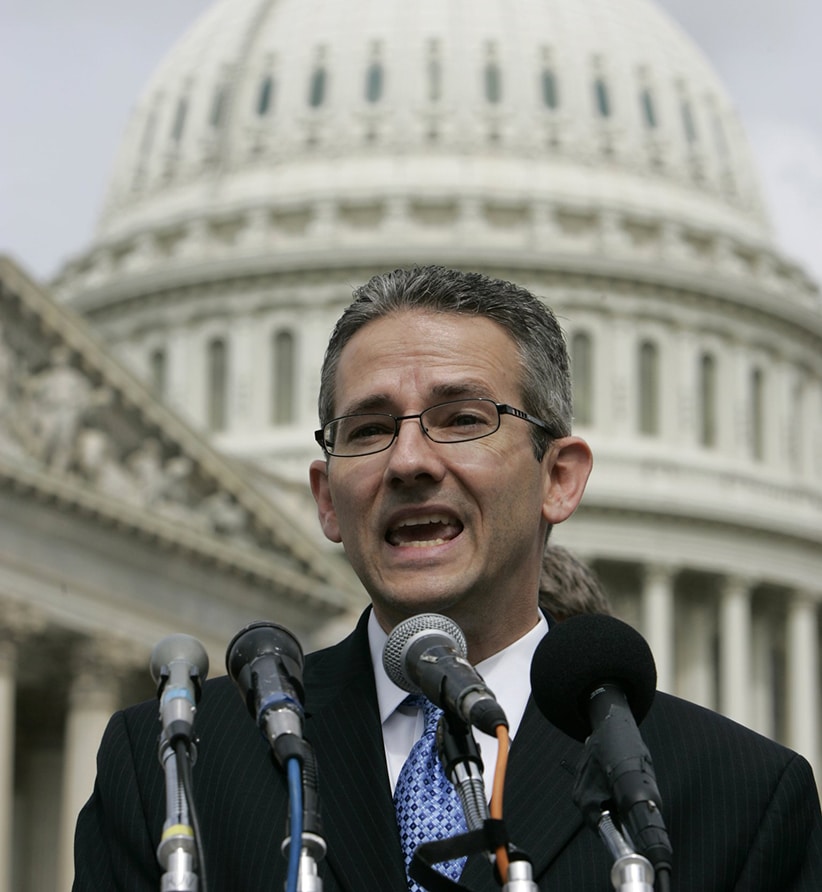
David Bereit
With a former Presbyterian minister as his father, David Bereit grew up attending church every Sunday. His first encounter with Catholicism came as a Boy Scout.
The local Catholic parish sponsored his scout troop, the 54-year-old pro-life leader said, and held an annual “Scout Sunday Mass.” The kneeling and standing left him confused, he remembered.
Then, while studying at Texas A&M University, he met Margaret.
“When we went on our first date to go out to lunch together, she was sharing with me just her passion for her Catholic faith,” he said of the woman he described as catching his eye and heart.
At the end of their lunch, she invited him to Sunday Mass. Seeing an opportunity for a second date, he said yes. He has attended Mass with her every Sunday since.
“In this journey, God’s given us this rich blessing of the transformational aspect of our Catholicism. And we just feel like, the rest of our lives, we want to share that with anybody and everybody we possibly can.”
— David Bereit
His conversion was not immediate, he said. It came nearly 26 years into their 30 years of marriage.
Bereit identified a “huge piece” that accelerated him along his journey: getting involved in the pro-life movement, initially by running the local pro-life group in College Station, Texas. While there, he led the first local 40 Days for Life campaign, he said, as well as started up 40 Days for Life as its own independent entity.
He described 40 Days for Life — a campaign that aims to end abortion through prayer and fasting, community outreach and a vigil outside of abortion clinics — as a type of Catholic immersion.
“More than 80% of the participants in 40 Days for Life were Catholic,” he said. “I was praying with people who were praying the Rosary and Divine Mercy Chaplets outside abortion centers and meeting bishops and priests and religious sisters.”
When he stepped away in 2016 to start something new, he turned to God for help.
“I finally was just driven to my knees to say, ‘God, what do you want?'” he said. “It was during that season that I ended up in an hour of adoration, feeling the call to start RCIA.”
He entered the Catholic Church at the Easter Vigil in 2018, with Margaret as his confirmation sponsor.
“It’s been an unbelievable journey, and I look back and I see not only does God continue to draw me closer to him, but also my wife and eventual children that helped me to see the Faith lived out,” he said. “And then all these faithful people in the pro-life movement, including many … converts, that helped me to kind of see the beauty and richness of the Faith and not as an abandonment of where I’d come from but as the next step in my spiritual journey.”
Located in Fredericksburg, Virginia, Bereit now serves as a strategic adviser for pro-life and faith-based groups. He also works as a leadership mentor and pro-life speaker.
Bereit remembers first paying attention to abortion while in college. While he never supported abortion, he was, as he put it, “passively pro-life.” That changed when Planned Parenthood decided to open an abortion clinic nearby.
When Bereit looks back on his life, he said, he considers his family “very blessed.”
Even when he and his wife struggled with infertility, he said, that helped them to grow in their understanding of Pope St. Paul VI’s 1968 encyclical Humanae Vitae. Today, they have two kids: a daughter who joined the Nashville Dominicans and a son studying at George Mason University, where he helps lead the Catholic campus ministry.
Together, Bereit and his wife remain active in faith circles, including by serving as marriage mentors for Catholic and mixed-faith couples.
“In this journey, God’s given us this rich blessing of the transformational aspect of our Catholicism,” he said. “And we just feel like, the rest of our lives, we want to share that with anybody and everybody we possibly can.”
Embracing the Faith
While describing what drew them to Catholicism, the pro-life leaders’ answers often overlapped. Rose and Hawkins highlighted the importance of the Eucharist.
“Truly believing that the miracle that happens at every Mass,” Hawkins said. “Once you understand that, that’s it, you’re sold.”
Rose experienced the same: “It was definitely learning about the True Presence and coming to recognize the True Presence in the Eucharist — that this is actually Jesus’ body, blood, soul and divinity,” she said.
Rose was also drawn to Church’s teaching on contraception and the totality of the Faith with its consistent, logical teaching. She embraced its beauty, from the beauty of the churches to that of the saints, especially the Blessed Mother.
Bereit called “everything” his favorite, but pointed to the richness and history of the Faith as well as witnessing the beauty of Catholics living out their faith.
Dannenfelser highlighted the writings and apologetics of the Church and the daily practices and prayers. She pointed, in particular, to the Litany of Humility.
“It’s a tough one, and that’s why it’s so good,” she said of the prayer on her desk.
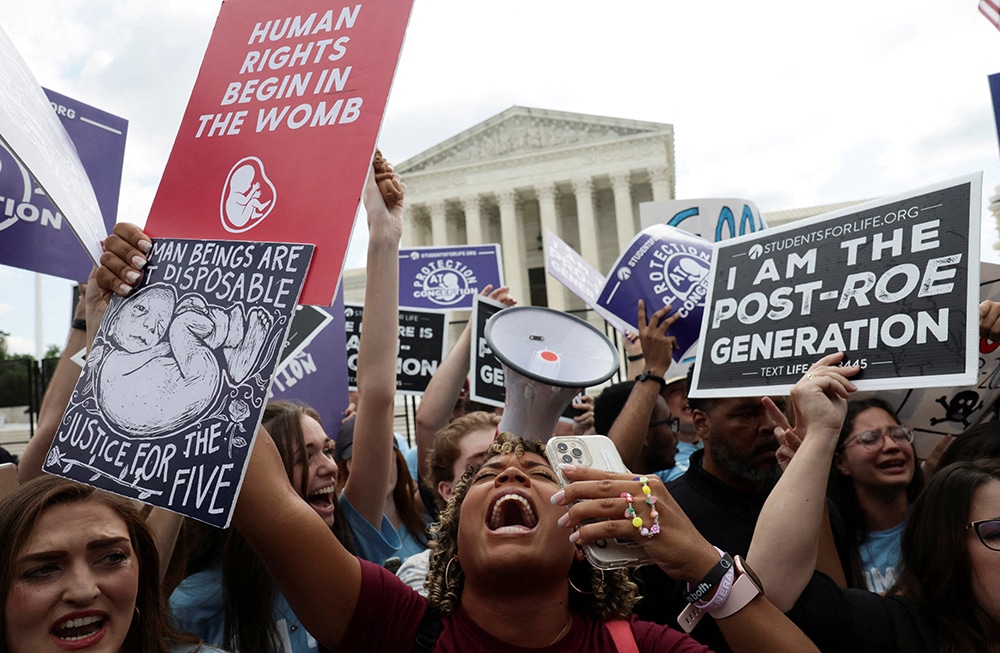
A pro-life advocacy and faith relationship
Today, the pro-life leaders agree that their faith impacts their pro-life advocacy.
“Everything I do, everything I want to do, I’m hoping to align it with getting my soul and other souls to heaven through Christ and his Church,” Rose explained.
Hawkins and Dannenfelser said they relied on their Catholic faith to persevere in their advocacy.
“We can always give, and must give, the intellectual argument, secular argument, for why the human being should be preserved from the beginning,” Dannenfelser said. “But in my personal life, I would never have endured this long had it not been for the lessons of the Faith.”
“I’m so riveted to that particular fact that all these children are lost and they — each one of them — was sent for a particular purpose, each one of them is a creation that is beyond our own imaginings,” she explained. “And each one that dies is a loss in his kingdom’s purpose for them that is for our benefit.”
“Everything I do, everything I want to do, I’m hoping to align it with getting my soul and other souls to heaven through Christ and his Church.”
— Lila Rose
Bereit said his faith continued to build and shape his pro-life advocacy, particularly when he delved into Catholic social teaching and the call to see Christ in every person.
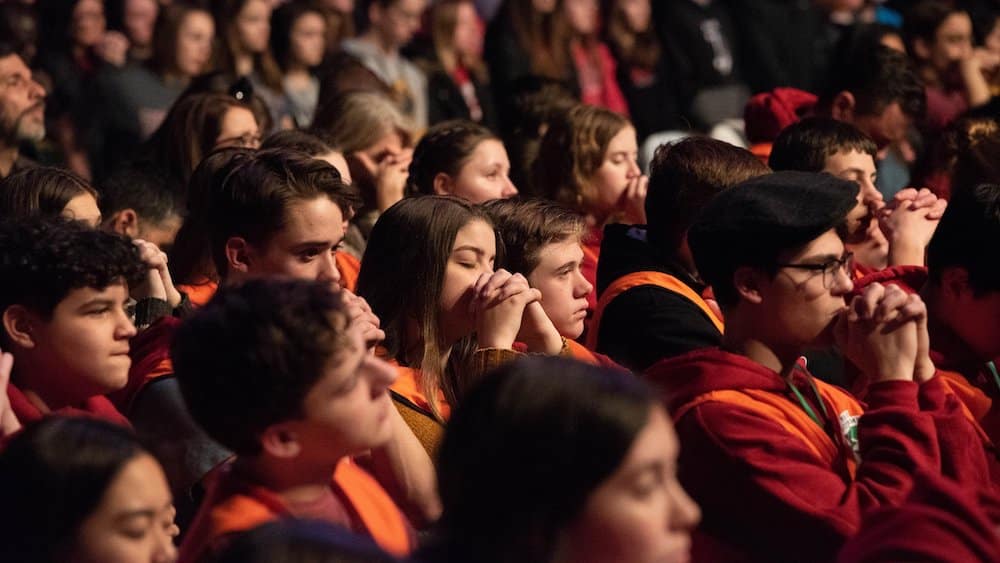
Moving forward
The four pro-life leaders stressed the importance of direction for the pro-life movement ahead of the first anniversary of the Supreme Court’s decision in Dobbs v. Jackson Women’s Health Organization, which left abortion up to the people and their elected representatives.
“I think that we need a new North Star,” Rose said following the decision that overturned Roe v. Wade. “There’s limitless opportunity right now of what we can do to make a difference to end abortion.”
Hawkins pointed to an upcoming rally by pro-life organizations that she said will express that “we have a new dream in the pro-life movement.” The National Celebrate Life Day event will be held on June 24, the anniversary of Dobbs, at the Lincoln Memorial in Washington, D.C.
At the same time, Hawkins encouraged Catholic dioceses, schools and parishes to continue attending the annual March for Life in Washington, D.C., as an event that has inspired so many young people to get involved.
Both Rose and Hawkins identified what they saw as the next focus legally: enshrining in federal and state law legal protection for the unborn under the 14th Amendment.
“We need to rethink and re-approach our messaging in a way that will reach people that may not think like we think and move them step by step from where they are to that Catholic understanding, in our world, of the dignity of the human person.”
— David Bereit
Rose also desired cultural change, including by serving women and families and making America more family-friendly.
Dannenfelser expressed the need to pass laws protecting the unborn, provide services for women and children, and elect a pro-life president who will support a federal minimum standard limiting abortion.
Bereit called for a new focus on strategy, innovation, collaboration and communication.
“We need to rethink and re-approach our messaging in a way that will reach people that may not think like we think and move them step by step from where they are to that Catholic understanding, in our world, of the dignity of the human person,” he said.
“Undergird all of that with a willingness to roll up our sleeves, walk with women and children in more heroic ways than we’ve ever done before,” he concluded. “I think that’s going to be key.”
Katie Yoder is a contributing editor for Our Sunday Visitor.

